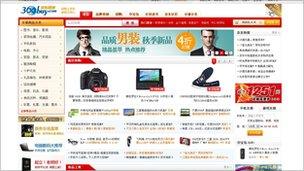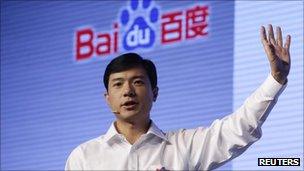Is China's dotcom boom a bubble about to burst?
- Published

Jingdong Mall's bold plans could signal trouble for China's internet start-ups
Chinese online retailer Jingdong Mall, which sells everything from shavers to steamers to smartphones, is not short on ambition.
Also known as 360buy.com, it is seeking to raise up to $5bn (£3bn) by listing shares in New York next year in what would be the largest ever US internet initial public offering (IPO).
If the deal materialises, it would be far larger than the listing of Google, which raised a paltry $1.9bn in comparison.
The daring move is raising eyebrows and sparking talk that China's dot.com boom could be turning into an unsustainable bubble.
It also comes as investors have grown wary of Chinese firms listed in the US following a number of accounting scandals.
The company is reported to be meeting with banks in Beijing this week to pick which financial institution will handle the bumper deal.
Credentials
At first glance, Jingdong Mall has some strong credentials.
Founded in 2004, the company is reported to have more than 25 million users and more than 50 million daily page views, and generates 300,000 orders per day.
It has already raised a whopping $1.5bn from a group of high-profile strategic investors including Digital Sky Technologies, which invested in Facebook and discount buying website Groupon in the US.
Members of the Walton family, who founded Wal-Mart, and Robin Li, the boss of Chinese internet darling Baidu, also ploughed money into the company.
China's answer to Amazon is also operating in a market rich with promise.
According to Shanghai-based technology research firm Redtech Advisors, the number of Chinese shopping online will near 200 million by the end of 2011, nearly double that of 2008.
And Forrester Research estimates that total web sales in China are likely to triple to almost $160bn in 2015 from about $50bn in 2010.
Challenges
But Jingdong Mall also has some major challenges to contend with.
New York has not turned out to be a sure bet for many of the company's peers.
Several Chinese internet companies have sold shares to US investors in recent months, and while their IPOs in many cases drew strong demand, their share prices have since lost ground dramatically.
E-commerce site DangDang, which has a similar business model to Jingdong Mall and listed in December, now trades well below its listing price.
Social networking site Renren and online video site Youku have also fared badly, and online dating site Jiayuan and Youtube rival Tudou both slid on their market debuts.
Scandals
A spate of accounting scandals at US-listed Chinese companies has also made investors wary.

Chinese shoppers are increasingly shunning stores and buying online
Since March, 30 US-listed Chinese firms have had their auditors resign and 20 have been delisted while regulators examine accounting and disclosure issues.
Concern over corporate governance has eroded confidence in other Chinese companies listed in New York, even those not accused of any wrongdoing.
US research firm Renaissance Capital calculates that if an investor had bought shares in every Chinese IPO between 2008 and June 2011, he or she would have made a loss of 24%. This compares with a 25% gain on the average non-Chinese IPO.
But Jingdong Mall is unlikely to look to list elsewhere. According to Renaissance Capital, US investors are viewed as being keener to invest in riskier assets such as internet stocks.
And to list in Hong Kong, the other favoured destination for Chinese firms looking to go public, companies must be profitable.
Loss-making Jingdong does not expect to make money until the second half of next year.
"Slow growing Chinese IPOs head to Hong Kong; growth companies embark for New York," Renaissance Capital said in a recent report.
Bubble deflating?

360buy.com has caught the attention of high-profile investors like Robin Li, who founded search engine Baidu
Doug Young, a Chinese media and technology expert who writes a column for Chinese-language daily China Business News, says there are signs the internet bubble in China may soon deflate.
Mr Young says the market is too crowded, with billions of dollars in new investment entering the market in the last year chasing consumer demand that, while growing, is still too small to support so many new players.
Early signs of distress include big layoffs at group buying site Gaopeng, in which Groupon has a stake, and online clothing store Vancl.
Mr Young says that Jingdong Mall's big-name investors will be pushing for an IPO before the bubble truly bursts and wipes out the billions they have pumped into the company.
As recently as May, the company's chief executive Liu Qiandong said that they would hold off until 2013 or later to float, when they were expected to be in profit.
"They are trying to [do an] IPO in a negative market," he says.
"But the alternative is that they don't raise the money they need and they run out of cash when the bubble bursts."
- Published9 September 2011
- Published30 August 2011
- Published18 August 2011
- Published8 December 2010
- Published4 May 2011